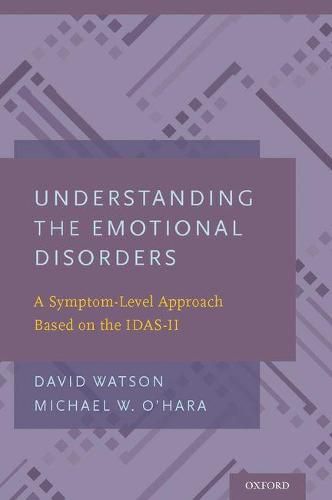Readings Newsletter
Become a Readings Member to make your shopping experience even easier.
Sign in or sign up for free!
You’re not far away from qualifying for FREE standard shipping within Australia
You’ve qualified for FREE standard shipping within Australia
The cart is loading…






Improving the measurement of symptoms of emotional disorders has been an important goal of mental health research. In direct response to this need, the Expanded Version of the Inventory of Depression and Anxiety Symptoms (IDAS-II) was developed to assess symptom dimensions underlying psychological disorders. Unlike other scales that serve as screening instruments used for diagnostic purposes, the IDAS-II is not closely tethered to the Diagnostic and Statistical Manual of Mental Disorders (DSM); rather, its scales cut across DSM boundaries to examine psychopathology in a dimensional rather than a categorical way. Developed by authors David Watson and Michael O'Hara, the IDAS-II has broad implications for our understanding of psychopathology. Understanding the Emotional Disorders is the first manual for how to use the IDAS-II and examines important, replicable symptom dimensions contained within five adjacent diagnostic classes in the DSM-5: depressive disorders, bipolar and related disorders, anxiety disorders, obsessive-compulsive and related disorders, and trauma- and stressor-related disorders. It reviews problems and limitations associated with traditional, diagnosis-based approaches to studying psychopathology and establishes the theoretical and clinical value of analyzing specific types of symptoms within the emotional disorders. It demonstrates that several of these disorders contain multiple symptom dimensions that clearly can be differentiated from one another. Moreover, these symptom dimensions are highly robust and generalizable and can be identified in multiple types of data, including self-ratings, semi-structured interviews, and clinicians’ ratings. Furthermore, individual symptom dimensions often have strikingly different correlates, such as varying levels of criterion validity, incremental predictive power, and diagnostic specificity. Consequently, it is more informative to examine these specific types of symptoms, rather than the broader disorders. The book concludes with the development of a more comprehensive, symptom-based model that subsumes various forms of psychopathology-including sleep disturbances, eating- and weight-related problems, personality pathology, psychosis/thought disorder, and hypochondriasis-beyond the emotional disorders.
$9.00 standard shipping within Australia
FREE standard shipping within Australia for orders over $100.00
Express & International shipping calculated at checkout
Improving the measurement of symptoms of emotional disorders has been an important goal of mental health research. In direct response to this need, the Expanded Version of the Inventory of Depression and Anxiety Symptoms (IDAS-II) was developed to assess symptom dimensions underlying psychological disorders. Unlike other scales that serve as screening instruments used for diagnostic purposes, the IDAS-II is not closely tethered to the Diagnostic and Statistical Manual of Mental Disorders (DSM); rather, its scales cut across DSM boundaries to examine psychopathology in a dimensional rather than a categorical way. Developed by authors David Watson and Michael O'Hara, the IDAS-II has broad implications for our understanding of psychopathology. Understanding the Emotional Disorders is the first manual for how to use the IDAS-II and examines important, replicable symptom dimensions contained within five adjacent diagnostic classes in the DSM-5: depressive disorders, bipolar and related disorders, anxiety disorders, obsessive-compulsive and related disorders, and trauma- and stressor-related disorders. It reviews problems and limitations associated with traditional, diagnosis-based approaches to studying psychopathology and establishes the theoretical and clinical value of analyzing specific types of symptoms within the emotional disorders. It demonstrates that several of these disorders contain multiple symptom dimensions that clearly can be differentiated from one another. Moreover, these symptom dimensions are highly robust and generalizable and can be identified in multiple types of data, including self-ratings, semi-structured interviews, and clinicians’ ratings. Furthermore, individual symptom dimensions often have strikingly different correlates, such as varying levels of criterion validity, incremental predictive power, and diagnostic specificity. Consequently, it is more informative to examine these specific types of symptoms, rather than the broader disorders. The book concludes with the development of a more comprehensive, symptom-based model that subsumes various forms of psychopathology-including sleep disturbances, eating- and weight-related problems, personality pathology, psychosis/thought disorder, and hypochondriasis-beyond the emotional disorders.